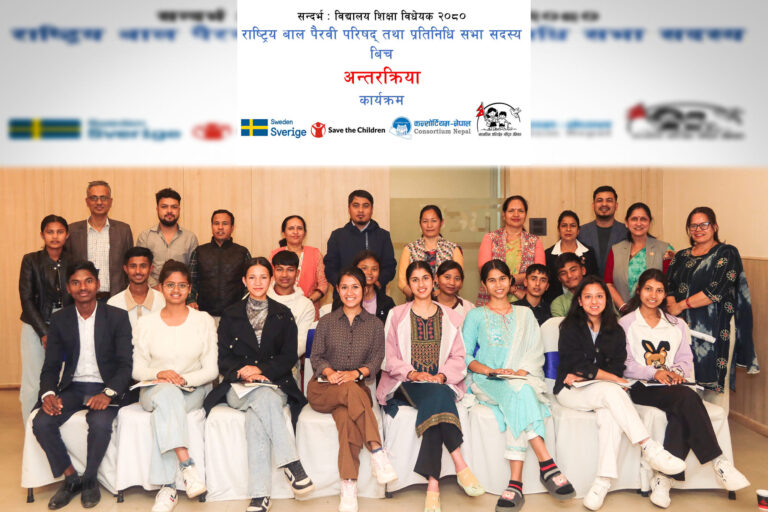Interaction on Education Bill 2080

On April 10, 2024, an interaction session was conducted at Alfa House, organized by Consortium Nepal in collaboration with Save the Children and CZOP. The purpose of this gathering was to discuss the draft of Education Bill 2080 from the lens of Children. In attendance were six Hon. Parliamentarians, alongside 16 members of the National Child Advocate Council (NCAC), who brought queries and concerns regarding child rights and educational reforms.
Hon. Devendra Poudel, Hon. Ranju Jha, Hon. Laxmi Tiwari, Hon. Ishwori Magar, Hon. Kalpana Miya and Hon. Sarita Bhusal Parliamentarians were present during the interaction program. The main objectives of the interaction program were to facilitate an open dialogue between parliamentarians and members of National Child Advocates Council regarding the draft education bill. Further, interaction aims to address concerns related to child rights and education, particularly focusing on ensuring access to quality education, promoting child participation, and addressing challenges such as curriculum changes and teacher accountability. NCAC members raised question regarding to the addressing child participation, emphasizing practical education, ensuring access to sanitary needs, adapting to curriculum changes, enhancing accountability, challenges with course completion, and promoting child participation in governance. Hon. Devendra Poudel, a former Education Minister, underscored three pivotal areas for improvement within the education sector: i. the enhancement of physical infrastructure, ii. The formulation of progressive policies, and iii. The refinement of teaching methodologies. Regarding to the chilod participation Hon Ishowori Magar assured that the education bill aimed to ensure the participation of children by converting private schools into public school. Hon. Ranju Jha addressed this issue by emphasizing the importance of technical education, particularly for students in grades 9, 10, and 11. She referenced the Education Act’s provisions for technical education, linking it to the Council for Technical Education and Vocational Training (CTEVT). Hon. Sarita Bhusal advocated for free education and said there should be strict regulations to prevent schools from charging fees and promoting public schooling. Hon. Kalpana Miya assured that the Education Bill, aimed to address these challenges by hiring thematic teachers and discouraging mid-year transfers to ensure educational consistency. Hon. Ranju Jha acknowledged the prevalence of such issues and proposed making school principals more accountable, with provisions for local-level monitoring and promotion of good teaching practices while Hon. Laxmi Tiwari discussed ongoing discussions to incorporate monitoring mechanisms into the bill. The local level is more responsible according to the law and of course, the local level is an important institution in monitoring the schools and teachers. Hon. Sarita Khanal assured ongoing discussions with curriculum designers and proposed a single medium of instruction to address these issues once the bill is passed. Hon. Kalpana Miya said to focus on localized approaches, emphasizing the importance of involving children in local-level planning processes in a local level that will develop a culture of inclusivity and empowerment although no specific provision was mentioned in the bill.